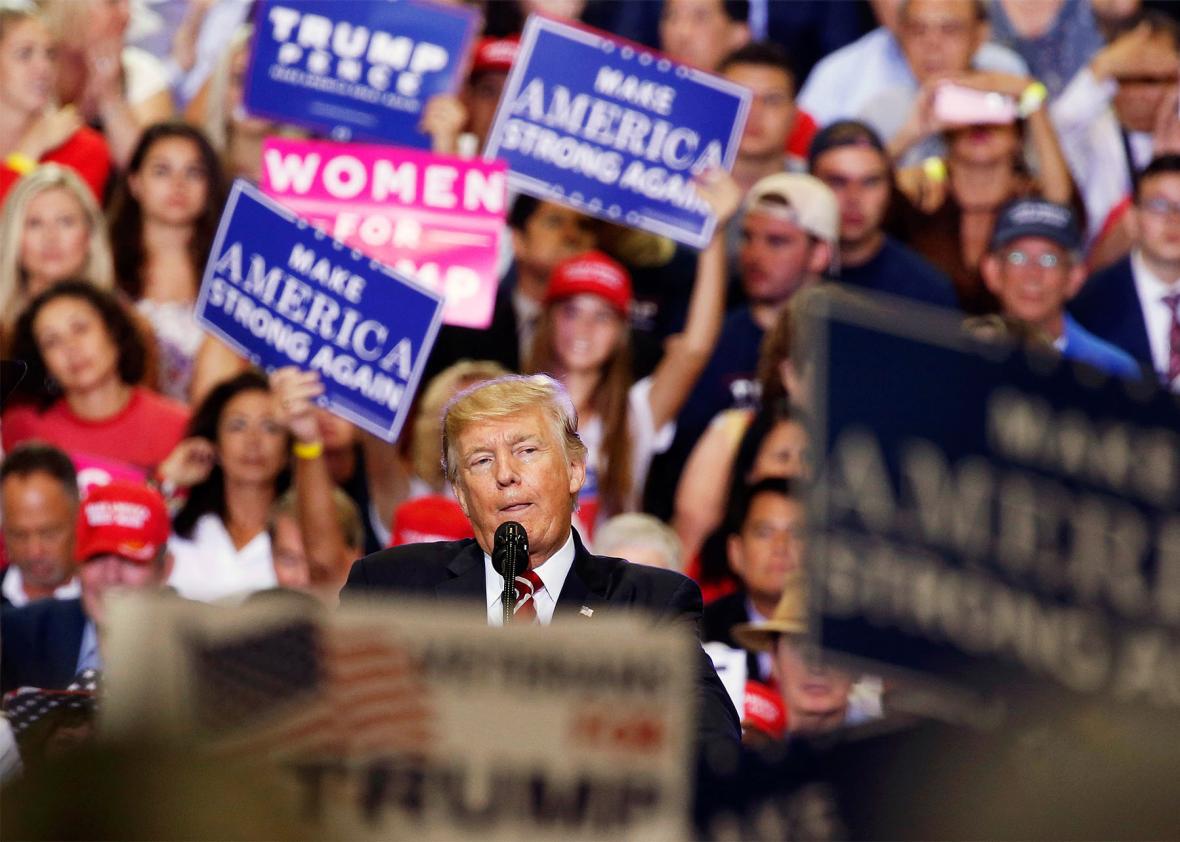For more than an hour, at a Tuesday night rally in Phoenix, the president of the United States—the most powerful elected official in the world—complained about the news media. That president—whose actions touch millions of lives—recounted (inaccurately) his response to the violence in Charlottesville, Virginia, framing himself as a victim of “fake news.” The president—who commands an arsenal of incomprehensible destructive power—angrily obsessed over the press for its coverage of his statements and speeches, giving a petulant rant the imprimatur of the Oval Office.
Put simply, the president threw a tantrum, blaming the media for a steady stream of self-inflicted wounds that have damaged his standing with key Republicans and destroyed it with a majority of voters. Indeed, this performance in Phoenix illustrates why, in a recent survey of voters in Michigan, Pennsylvania, and Wisconsin, more than 6 in 10 respondents called him an “embarrassment.” When a president behaves this way, publicly wallowing in anger and frustration, it is embarrassing.
It was embarrassing for the president to hold such a self-congratulatory event given his thin record of achievement. President Trump has little to show for his seven months in office—his agenda is stillborn. And barring sudden changes in his skill and aptitude for the job, it will stay that way. As the year comes to a close and the midterm elections begin to loom, Congress will lose its appetite for serious (and potentially controversial) legislation. Unless Trump acts now, he’ll lose his window for accomplishing real things. At this moment, the president should be searching for ways to move the ball forward. Instead, he was on stage, complaining to his most die-hard supporters.
It was embarrassing that the president, in pursuit of his petty grudge against a news media that fails to fawn over him, would rehash his statements on Charlottesville, omitting his equivocation toward and outright defense of white supremacists, as if his statements hadn’t aired on live television. “The truly dishonest people in the media and the fake media, they make up stories,” said Trump. “They don’t report the facts. Just like they don’t want to report that I spoke out forcefully against hatred, bigotry, and violence and strongly condemned the neo-Nazis, the white supremacists, and the KKK.” Giving us a glimpse into his psyche, he then bragged that he attended “better schools” than the press, had “better grades,” and lived in a “bigger, more beautiful apartment.”
Trump blamed the media for “fomenting divisions” in the country and—in a nod toward the controversy over Confederate monuments—charged them with “trying to take away our history and heritage,” a comment that echoed the language of white supremacists even as he insisted that he rejected their beliefs. Pivoting to immigration, Trump asked the audience if they supported former Maricopa County Sheriff Joe Arpaio, recently convicted of criminal contempt for ignoring a court order to stop detaining people he merely suspected of being unauthorized immigrants. “I think he’ll be just fine,” said Trump, hinting at a pardon for Arpaio, who was criticized for racist, dehumanizing practices during his time as sheriff.
Trump played the well-worn hits of his presidential campaign, marveling at the size of the crowd and dismissing protesters as insignificant. (Reports say that attendance was smaller than claimed and that the venue was surrounded by anti-Trump demonstrators.) He promised to “build the wall” on the border with Mexico and threatened to shut down the government if Congress doesn’t fund the project. And throughout, he ranted and raved against the media with language that came close to outright incitement. “These are really, really dishonest people and they’re bad people and I really think they don’t like our country,” said Trump of the press. “The only people giving a platform to these hate groups is the media itself and the fake news.”
It’s not that this performance was unexpected; from beginning to end, it was in line with his behavior as a candidate. We know from experience that this, and not the sedate figure of Monday’s speech announcing increased troop levels for Afghanistan, is the real Trump, a resentful demagogue who thrives on the adulation of crowds. And despite the hopes of some observers, there was no chance that he would change once in office—that he would rise to the responsibilities of the presidency. Still, it was shocking to see Trump’s full id on display.
We will see it again. For Trump, the Phoenix rally was a kind of therapy—a needed venting session after a week of harsh criticism. As long as he is unable to do the work of the presidency, as long as his tenure is defined by constant scandal and controversy, he will need this ego-soothing respite—this simulacrum of popular support. This spectacle will repeat itself. It won’t be long before we will again watch the president of the United States debase himself, and his office, for a little applause.
